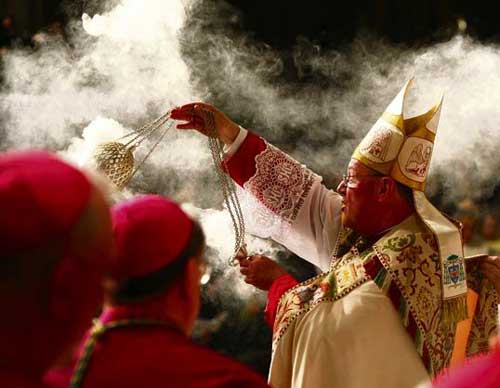
It is always fascinating to pore over church service advertisements. Especially the way a community perceives itself, what it thinks it is important, and how it expresses itself to visitors and seekers:
- a devotional service
- Family service
- Festival Eucharist with Easter Hymns
- Traditional Holy Communion (BCP) with hymns
- Informal lively service with communion
But the prize in Holy week’s advertising goes to:
“Sung Festival Eucharist with incense”
I am not sure if the phrase, “with incense” is there as a warning or as an invitation! Possibly a warning as recently the Chichester District Council sent an Environmental Health Team to St Paul’s, Chichester, after a complaint that incense fumes made a parishioner unwell. The Rector, the Revd Richard Hunt, said that he would put up a notice about the use of incense.
A council spokeswoman said: “The investigation carried out by our team concluded that there is insufficient evidence to show that the occasional burning of incense, within St Paul’s Church, represents any significant hazard to health.” The church was large and airy; so the smoke would be “significantly dispersed”, it was well ventilated, and the blown-air heating system would “dilute” any smoke.
An interesting doctoral thesis (please credit me): correlating incense health issues and theological/liturgical perspectives. Remembering incense has been shown to cause antidepressive behaviour in mice. It also activates the poorly understood ion channels in the brain alleviating anxiety and depression.
When asked: what is incense for? The answer is: for the nose.
Remember in the afterlife the Bible speaks of there being two alternative smells: one is incense, the other… which do you prefer getting used to?




I’ve come across this article before. At the Cathedral in Bathurst, NSW, we advertise “with incense” due to people’s complaints that they could not breathe/it brought on asthma, etc, so people are not surprised by incense or have it inflicted on them. Personally, I find it something of an invitation, and some do take it as such.
Thanks Sharon. I’m a little unclear what you mean when you say, “I’ve come across this article before” – do you mean my quote, or my reference to the research? As it reads, you may give the impression the blogpost may not be original, which I assure you it is.
In our Parish, it’s definitely a warning. A few people stay away because of physical discomfort when incense is used, and are very vocal if it is used without some weeks’ notice.
Recently at a special anniversary Mass for the founding of the original (or one one of the)church(es) in my hometown, the priests were swinging that censer round. We were right up front and got a face full. Doesn’t bother me, since my lungs are well coated with all manner of foreign material. But my ten-year-old son had to ask (rather loudly during a quiet interval) “Mom, why are they spraying that stuff on us?”
Do Orthodox priests have a higher incidence of COPD than other priests? Evangelicals in general?
I would appreciate links to those studies you mention.
Oops. Reading this on my BlackBerry meant I missed the link. Sorry.
In the Rc church, I remember that the people who complained about incense also had liturgical issues with its use. On the other hand, my younger daughter, who has asthma, had no problems with it…
Having been brought up a Catholic and served as an Alter Server, incense was part of my young life.
Now as an Anglican I only rarely see incense in use. But than I do not normally attend Anglo-Catholic services. I have no issues with its use, if it adds to the experience of those attending worship, all to the good.
I know that sometimes the ‘smells and bells’ type of service in Anglican Churches gets a bad press – I can’t think why?
If someone has an allergy to incense, than avoid the services where it is used.
My Mother is deathly allergic…..to EASTER LILLIES! I can remember a choir director with the same problem — at Easter his face would swell, his tear ducts would go into overload and he was sick as a dog.
It’s always something.